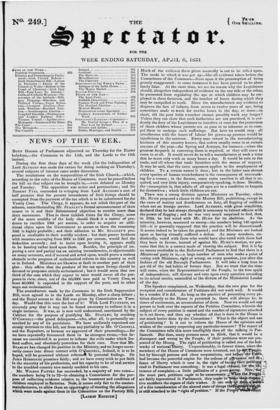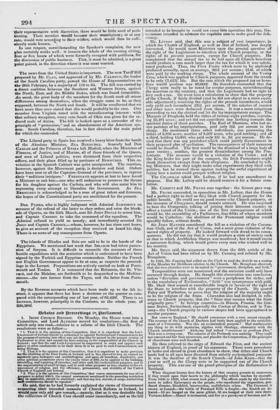NEWS OF THE WEEK.
Born Houses of Parliament adjourned on Thursday for the Easter holydays,—the Commons to the 15th, and the Lords to the 16th instant.
During the first three days of the week (for the indisposition of Lord Ammons, was made the excuse for doing nothing on Thursday), several subjects of interest came under discussion.
The resolutions on the temporalities of the Irish Church,—which, according to the rules of the House of Commons, must be passed before the bill on that subject can be brought in,—were debated on Monday and Tuesday. The opposition was active and pertinacious ; and Sir ROBERT PEEL succeeded in wringing from Lord Arritom, a sort of "half promise that the present incumbents of Irish livings should be exempted from the payment of the tax which is to be substituted for,the Vestry Cess. The Clergy, it appears, do not relish this part of the scheme, notwithstanding Mr. STANLEY'S formal announcement of their assent to it and their disinterested objection to receive more than .their successors. That in these ticklish times for the Clergy, some of the more wealthy of the body should think it a matter of pru- dence to sacrifice 1001. per annum, in order to acquire an addi- tional claim upon the Government to secure to them the remaining 1001. is highly probable ; and their adhesion to Mr. STANLEY'S pro- posal is creditable to their worldly wisdom : but their poorer brethren with incomes averaging from 2001. to 250/. per annum, would feel the -deduction severely ; and to insist upon levying it, appears really to be bearing rather hard upon them. Besides, the principle of im- posing a new and partial tax on existing incumbencies, is objectionable on many accounts, and if avowed and acted upon, would prove a serious obstacle to the progress of ecclesiastical reform in this country as well as in Ireland. Ministers are likewise at fault in another part of their plan : they affirm that the produce of the tax upon livings should be devoted to purposes strictly ecclesiastical; but it would seem that one :third of the sum which they expect to raise would cover all the pur- poses in view, since, out of the 60,000/. now paid as Vestry Cess, at . least 40,000/. is expended in the support of the poor, and in other ways not ecclesiastical.
The amendments made by the Commons in the Irish Suppression Bill, were agreed to in the Lords on Monday, after a sharp debate ; and the Royal assent to the Bill was given by Commission on Tues- day. Would that this were the last of it! With Lord PLUNKETT, we sincerely pray that it may not be found necessary to enforce it in a single instance. It was, as is now well understood, sanctioned by the Cabinet for the purpose of gratifying Mr. STANLEY, by crushing O'CoNsmu.—the grand delinquent—who, after all, is personally un- touched by any of its provisions. We have uniformly expressed our streng:dveriion to this bill, not from any partiality to Mr. O'CONNELL and the Repealers, or because we approved of their proceedings,—for we have repeatedly denounced them in he strongest terms, but be- cause we considered it as potent to inflame the evils under which Ire- land suffers, and absolutely powerless for their cure. Now that Mr. STANLEY has changed his position in the Ministry, and no longer neces- sarily comes into direct contact with O'comsaLt, Ireland, it is to be hoped, will be governed without referen Si personal feelings. Sir JOHN HcinnousaPromises fairly; and we have every wish to put faith - in the sincerity of his professions, and his capacity to be of real service to the troubled country now mainly confided to his care.
Mr. WILSON PATTEN has succeeded, by a majority of two votes- . the numbers being 74 to 72—in obtaining a Commission for the pur- pose of collecting evidence relative to the 'treatment and condition of children employed in factories. Noir, it seems only fair to the master- manufacturers, to allow them an opport4ity of meeting the allegations . which were made against them in the-Committee on the Factory Bill. Much of the evidence there given assuredly is not to be relied upon. The mode in which it was got up—like all evidence taken before the Committees of the Commons—fixes upon it the presumption of being grossly exaggerated : in some instances it has been proved to be abso- lutely false. At the same time, we see no reason why the Legislature should, altogether independent of evidence on the one side or the other, be prevented from regulating the age at which children may be em- ployed in these factories, and the number of hours during which they may be compelled to work. Have the manufacturers any evidence to disprove the fact of infants, from seven to twelve years of age, being sometimes made to work for twelve hours in the day, or more—in short, till the poor little wretches cannot possibly work any longer? Unless they can show that such barbarities are not practised, it is evi- dently the duty of the Legislature to interfere at once for the protection of those children whose parents are so poor or so inhuman as to com- pel them to undergo such sufferings. But here we would stop : all interference with the hours of labour for grown-up persons would be injudicious in the extreme. Every man versed in the manufacturing business of this country knows, that orders usually come in at certain seasons of the year—the Spring and Autumn, for instance--when the greatest despatch in executing them is required, or they will cease to come in at all. It would never do to tell a manufacturer at such a time that he must only work so many hours a day. It would be ruin to the trade, and all whom that trade furnishes with the means of support. It may be said, that the same argument applies to the employment of children. To a certain extent it does ; but in the latter case almost every species of human wretchedness is the consequence of overwork- ing for a season ; in the former, some extra exertion is all that is re- quired, and very little injury, comparatively speaking, is done. Besides, the presumption is, that adults of all ages are in a condition to bargain for themselves ; which little children are not.
There was a strong division against Ministers on Tuesdays when Mr. HUME proposed a clause in the Mutiny Bill, prohibiting, except in the cases of Mutiny and drunkenness on duty, all flogging of soldiers when not on foreign service. Lord ALTHOUP, with great simplicity, declared that he had always thought it necessary to intrust 'officers with the power of flogging ; and he was very muds surprised to find, that, in 1824, he had voted with Mr. HUME for its abolition. As the minority, however, mustered so strong—the numbers being 140 against 151—it is generally supposed that the practice will be discontinued. It seems indeed to be taken for granted ; and the Ministers are looked upon as having virtually suffered a defeat. As many members, un- doubtedly, voted with them who would have also voted with them had they been • in favour, instead of against Mr. HUME'S motion, we pre- sume that this is a correct mode of viewing the subject. But. it is by no means creditable to the Reformed Parliament to find that there is a Ministerial party in it,--a large number of men who make a point'of voting with Ministers, right or wrong, on every question, just after-the fashion of the old Borbugh Parliaments. It will take a long time to get rid of the bad habits of former days. But we trust that the time will come, when the Representatives of the People; in the true spirit of independence, will, discuss and vote upon every question according to its actual merits, unmindful of the dictum of the Ministerial. Leader of the day.
The Speaker complained, on Wednesday, that the new plan for the reception and consideration of Petitions did not work well. It would be a wonder if it did. As long as the practice of presenting every pe- tition directly to the House is persisted in, there will always be, in times of excitement, an accumulation of them. Now we would ask any person to look over the reports of the Petition Committee, wherein the subject of every petition is stated and the number of signatures attached to it set down, and then say whether all that is done in the House is not Much better done, by the. Committee ? What is the object and Use of petitioning?" 'Is it not to inform the House of the opinions and wishes of the country respecting any-particular measure? The report of the Committee tells this more intelligibly than all the talking in Par-
' But then, many persons seem to think, that it would be a
disrespect: and wrong to the People, if their petitions were not pre- sented iri the House. The right of petitioning is called one of the bul- warks of nationaltberty. Unquestionably, in former times, when the members of the House of Commons were returned, not, b. e, but by borough patrons and close corporations, and b : ye tied had become the powerful engine for the redress of gslInvp*es fence of liberty which it now 'is, the right of haviiietheirisetiti /-f- read in Parliament was something: it was a legal clgnmeljor terance of complaint—a little palliative of a great • .!13g. the most. part, petitions ouglit to be unnedessary..-.7-en are fairly represented in Parliament, they ought to'404.e tive members the organs bf their wishes: - can only T* of a dtie consideration of the altered state'of things OM is!stillattached tithe "right of petition." If the Pee their representative with discretion, there would be little need of pea, toning. Their member asiniht become their Mouthpiece ; or at any rate, would vote according to their wishes; which would thus be suffi- ciently made known. ""
In one respect, notwithstanding the Speaker's complaint, the new plan certainly works well : it insures the whole of the evening sitting, four or five hours of which were formerly occupied with petitions, for the discussion of public business. This, it must be admitted, is a great point gained, in the direction where it was most wanted.





















